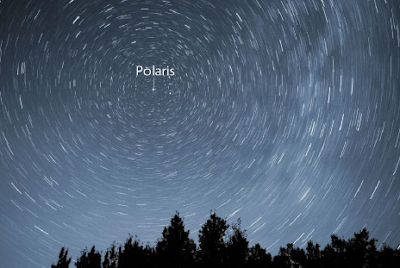98. Polaris should not remain directly over the North Pole on a revolving Earth moving through space
"NASA and modern astronomy say Polaris, the North Pole star, is somewhere between 323-434 light years, or about 2 quadrillion miles, away from us! Firstly, note that is between 1,938,000,000,000,000 - 2,604,000,000,000,000 miles making a difference of 666,000,000,000,000 (over six hundred trillion) miles ! If modern astronomy cannot even agree on the distance to stars within hundreds of trillions of miles, perhaps their “science” is flawed and their theory needs re-examining. However, even granting them their obscurely distant stars, it is impossible for heliocentrists to explain how Polaris manages to always remain perfectly aligned straight above the North Pole throughout Earth’s various alleged tilting, wobbling, rotating and revolving motions."
Dubay getting his facts wrong, making a misleading statement and a silly argument
Select this link to see a long exposure of the Pole Star. If you look very closely you can detect the small movement of the Pole Star.
Techniques for making these estimates involve analysing binary stars, red shift and estimates of the speed of the expansion of the universe, all things that are not exact.
< Prev 91-100 Next >
Dubay getting his facts wrong, making a misleading statement and a silly argument
The false fact
Polaris does not remain perfectly aligned above the North Pole, it is slightly offset. Consequently is traces a circle with a radius of 0.7°. This can be seen if you take a long-exposure photograph through a telescope.Select this link to see a long exposure of the Pole Star. If you look very closely you can detect the small movement of the Pole Star.
The misleading statement
Dubay describes the earth as “wobbling”. This is true but he fails to mention that the wobble is extremely small and slow. For example in the 30 days from 23 March 2018 the tilt of the earth changed by only 0.00001°, or 0.04". This is tiny slow movement would obviously be impossible to see in the trace of the Pole Star.The silly argument
The universe is huge. A star hundreds of light years is very very far away and it is impossible to measure the distance with direct observation using parallax. Consequently it is obviously very hard to be accurate with distances and these have to be estimated using indirect methods. To try and discredit science because the universe is hard to observe at the huge distances involved is very silly.Techniques for making these estimates involve analysing binary stars, red shift and estimates of the speed of the expansion of the universe, all things that are not exact.
< Prev 91-100 Next >




Comments
Post a Comment